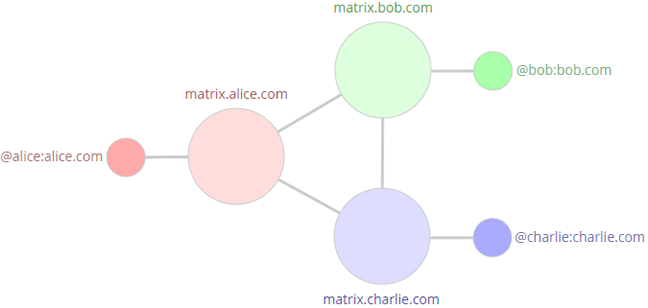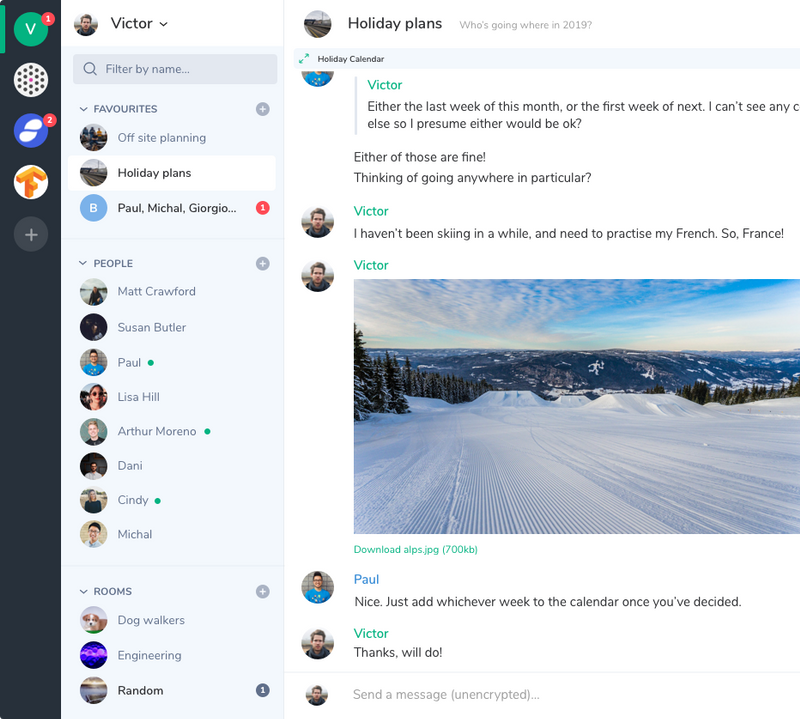Matrix 1.0 - Decentralized Messaging Protocol Release
On June 11, 2019, the developers of the Matrix.org Foundation announced the release of Matrix 1.0, a protocol for implementing a federated network built on the basis of a linear event history (events) inside an acyclic graph (DAG). The most common way to use the protocol is to implement message servers (for example, Synapse server, Riot client) and “connect” other protocols to each other through bridges (for example, the implementation on libpurple with XMPP, Telegram, Discord and IRC support).

The main innovation (and prerequisite for using) of the Synapse 1.0 server - Matrix 1.0 protocol implementations - is the use of a TLS certificate (free Let's Encrypt is also suitable) for the server domain, which provides for secure data transfer between servers participating in the federated network. Therefore, if you use a self-signed certificate for your home server, you need to create a valid certificate - otherwise your server will stop interacting with other servers on the network.
The plans for the release of the Matrix 1.0 protocol were announced in Brussels in February 2019 at the largest Open Source conference FOSDAM 2019 as part of the work on implementing the Matrix.org Foundation technology to provide the communication infrastructure of the French government.
')
Interestingly, two months ago, the matrix.org server was subject to a hacker attack, which had to re-create the matrix.org server database (with the loss of the history of encrypted chats stored on the servers) - and also re-release the Riot application for Android - due to key leakage and passwords. Hackers left recommendations for improving business processes and server security (related to vulnerabilities in Jenkins, the software development and testing automation platform). Matrix home servers were not affected, with the exception of the temporary unavailability of stickers for users' messages and other minor services.
The most popular client of Riot.im (current version 1.2.1) - available both in desktop implementations and on most mobile platforms - came close in convenience and reliability to similar clients for Slack and Telegram.

As I already wrote , Synapse servers are quite undemanding on hardware - ARM microcomputers for $ 49 can be used for a home server, and due to the appearance of virtual machines on ARM Graviton processors at the end of last year in Amazon Cloud inexpensively set up a “home mini-datacenter” in the Amazon cloud.
News and more info - matrix.org

The main innovation (and prerequisite for using) of the Synapse 1.0 server - Matrix 1.0 protocol implementations - is the use of a TLS certificate (free Let's Encrypt is also suitable) for the server domain, which provides for secure data transfer between servers participating in the federated network. Therefore, if you use a self-signed certificate for your home server, you need to create a valid certificate - otherwise your server will stop interacting with other servers on the network.
The plans for the release of the Matrix 1.0 protocol were announced in Brussels in February 2019 at the largest Open Source conference FOSDAM 2019 as part of the work on implementing the Matrix.org Foundation technology to provide the communication infrastructure of the French government.
')
Interestingly, two months ago, the matrix.org server was subject to a hacker attack, which had to re-create the matrix.org server database (with the loss of the history of encrypted chats stored on the servers) - and also re-release the Riot application for Android - due to key leakage and passwords. Hackers left recommendations for improving business processes and server security (related to vulnerabilities in Jenkins, the software development and testing automation platform). Matrix home servers were not affected, with the exception of the temporary unavailability of stickers for users' messages and other minor services.
The most popular client of Riot.im (current version 1.2.1) - available both in desktop implementations and on most mobile platforms - came close in convenience and reliability to similar clients for Slack and Telegram.

As I already wrote , Synapse servers are quite undemanding on hardware - ARM microcomputers for $ 49 can be used for a home server, and due to the appearance of virtual machines on ARM Graviton processors at the end of last year in Amazon Cloud inexpensively set up a “home mini-datacenter” in the Amazon cloud.
News and more info - matrix.org
Source: https://habr.com/ru/post/455800/
All Articles